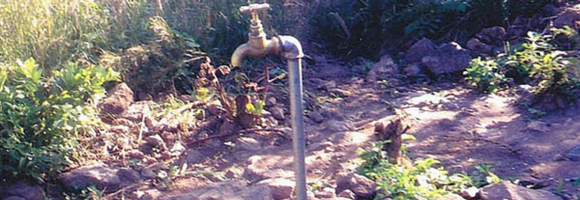Help Repair The Water Supply System In Rumphi

We all need clean water to drink and use on a day-to-day basis. Unfortunately, in so many places throughout Africa, water can be scarce and difficult to find. Sometimes people have to walk for hours in the hot sun in order to find a source of clean water. The people of Rumphi, Malawi, are dealing with this very problem right now. Students of St. Patrick’s Seminary and hundreds of others in the surrounding community are on the verge of losing their reliable supply of clean water.
“It is wise to bring some water, when one goes out to look for water.”
Ancient Proverb
Dear Mr. Doe,
I hope you are well! I also hope that in the midst of this busy day you will take a moment to read my letter. It is of critical importance — especially for the people of Rumphi, Malawi in southeast Africa.
The proverb I shared with you at the beginning of my letter is so appropriate for the people of Rumphi. Like so many others throughout much of Africa, water can be so scarce and difficult to find that sometimes a person may have to walk for hours in the hot sun in order to find a source of clean water. So in essence — it truly is wise to bring some water, when one goes out to look for water. The people of Rumphi, Malawi (a small landlocked country in southeast Africa), are on the verge of facing a water crisis of their own. And even though they have had a reliable supply of clean water for more than 40 years now — they are at risk of losing it! That is why I am writing this important letter to you.
Recently, I received a letter from Fr. Daniel Kamanga, a priest who works at St. Patrick’s Seminary located in the Rumphi district. In his letter, he explained the water crisis that the students at the seminary — along with hundreds of others in the surrounding community — are facing.
“The water supply system we have been using for more than forty years is made up by combination of pvc (thick plastic) pipe and galvanized pipe that runs for more than five miles from a reservoir. The pipe twists and turns over rugged terrain. The pipeline not only provides for the water needs of the 170 students in the seminary, but for the patients and staff at St. Patrick’s Health Center (which has a large maternity clinic), a convent with young women preparing to become religious Sisters, a center for handicapped children; a full primary school and staff and the village of Mulongoti nearby.”
“The original system of piped water supplying the school was constructed in the early 1970s,” he continues. “The system can no longer adequately support the mission and the surrounding villages. In short, the system cannot meet the growing water demand at the mission. At times, the Health Center does not have water at all! In such a dire situation, pails are used to fetch water from a distance of a half mile or more.”
“The entire system is in urgent need of repair,” Fr. Daniel concludes. “Some of the galvanized pipe needs replacing. Masonry work needs to be done on some of the supports; some of the reservoir tanks need replacing; and faucets and valves need to be repaired or replaced. There are more than 1,200 men, women and children who rely on this single source of water. I am hoping you can help us.”
As I read Fr. Daniel’s letter, I could not imagine the anguish that the people of the community — the students, the handicapped children, the staff — the people of the entire village — must be going through . . . wondering if they might lose their only reliable source of clean water!” Along with Fr. Daniel, I am hoping that you can help.
First, I would ask that you take every opportunity to conserve the water that we have. Some people suggest doing things such as taking shorter showers, running the dishwasher less frequently, doing the laundry only when there is a full load, as well as using a carwash instead of washing your car yourself (because most carwashes recycle their water). Whatever you decide, I would also ask that you share these ideas within your community and family. A little conservation by each of us can go a long way!
It is also my sincere hope that we can raise at least $35,000 to be used to help the people of Rumphi (Fr. Daniel’s region) keep their water flowing and to support other water projects in missions throughout East Africa. Along with his letter, Fr. Daniel included a list of materials that they need to purchase in order to keep the water system operating: $5,200 is needed just for pipes and valves; another $2,500 is need to cover the cost of bricks and cement to support the pipes that run across ravines and gullies. If you could perhaps make a special donation to cover either of the pipes or the bricks and cement — what a blessing that would be! For whatever you can possibly do, please accept my most heartfelt thanks.
